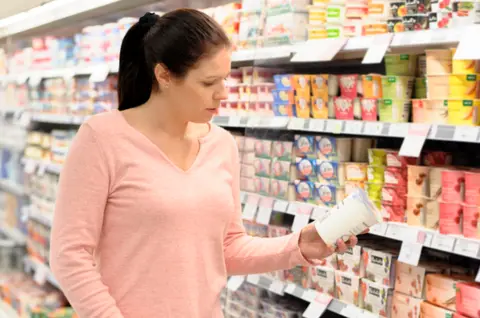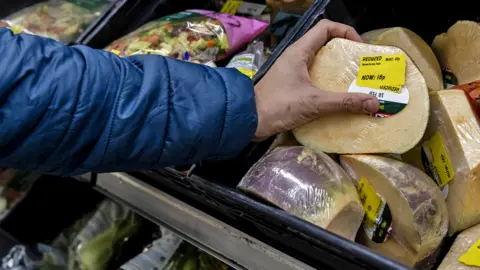Worse to come for food price rises, warns industry
 Getty Images
Getty Images"Relentless" increases in the price of food may not hit their peak until next year, an industry group has warned.
The Food and Drink Federation, which represents UK food and drink makers, said it usually takes 7-12 months for producers' costs to reach shop shelves.
Russia's invasion of Ukraine has accelerated manufacturing costs such as energy and fertilizer.
The federation's boss, Karen Betts, warned prices would "absolutely" get worse before they get better.
Food and drink price inflation rose to 8.7% in the year to May, according to the Office for National Statistics.
"I think the peak could well be into next year and that prices could well rise some way above 10%," Ms Betts told the BBC.
Other groups, such as the Institute of Grocery Distribution, which provides analysis to major grocers, predict that prices could rise by as much as 15% as household staples such as bread, meat, dairy, fruit and vegetables become more expensive.
The UK's overall inflation rate hit its highest level for 40 years in May, as the costs of energy, fuel and food continued to climb.
People struggling with the rising cost of living are already cutting back on groceries or even skipping meals, according to a BBC survey of UK households.
'Breadbasket of Europe'
Ms Betts said that food and drink manufacturers had already seen costs rise during the pandemic due to supply and labour shortages - but the Ukraine war has worsened the situation.
"The manufacturers that I speak to are saying that at the moment all their input costs are rising, so that's everything from ingredients to raw materials, energy, labour and they can't see an end to that," she said.
Both Russia and Ukraine are major suppliers of fertilizer, while Ukraine - known as the "breadbasket of Europe" - produces significant amounts of wheat, corn and sunflower oil.
But the conflict is disrupting the supply of these goods, driving up prices on international markets.
Meanwhile sanctions against Russia - a major oil and gas producer - have further pushed up global energy prices, hitting businesses and consumers alike.
 Getty Images
Getty ImagesMs Betts said there was "usually a seven-to-12 month time lag in the prices that food manufacturers pay before those price rises are felt on shop shelves".
"So, if it is costing more to plant and grow wheat or sunflowers for sunflower oil now then those price rises are going to take 12 months, perhaps longer to make their way into food prices in the UK," she said.
The UK's overall inflation rate hit 9.1% in May and the Bank of England predicts it could reach 11% this year.
One of the biggest concerns is that household energy bills are likely rise further in October, when the energy regulator Ofgem is expected to lift the cap on gas and electricity prices.
Work and pensions secretary Thérèse Coffey told the BBC's Sunday Morning programme: "The government knows this this is a challenging time for people.
"The spike of inflation leading to a hike in bills is largely driven by after-shocks of Covid, so the global supply chains are are still not flowing, but undoubtedly the decision we have made to tackle Putin and his invasion of Ukraine also has consequences particularly on energy costs."
She highlighted the government's package of measures to help households with energy costs, including a £400 discount on fuel bills for all homes.
